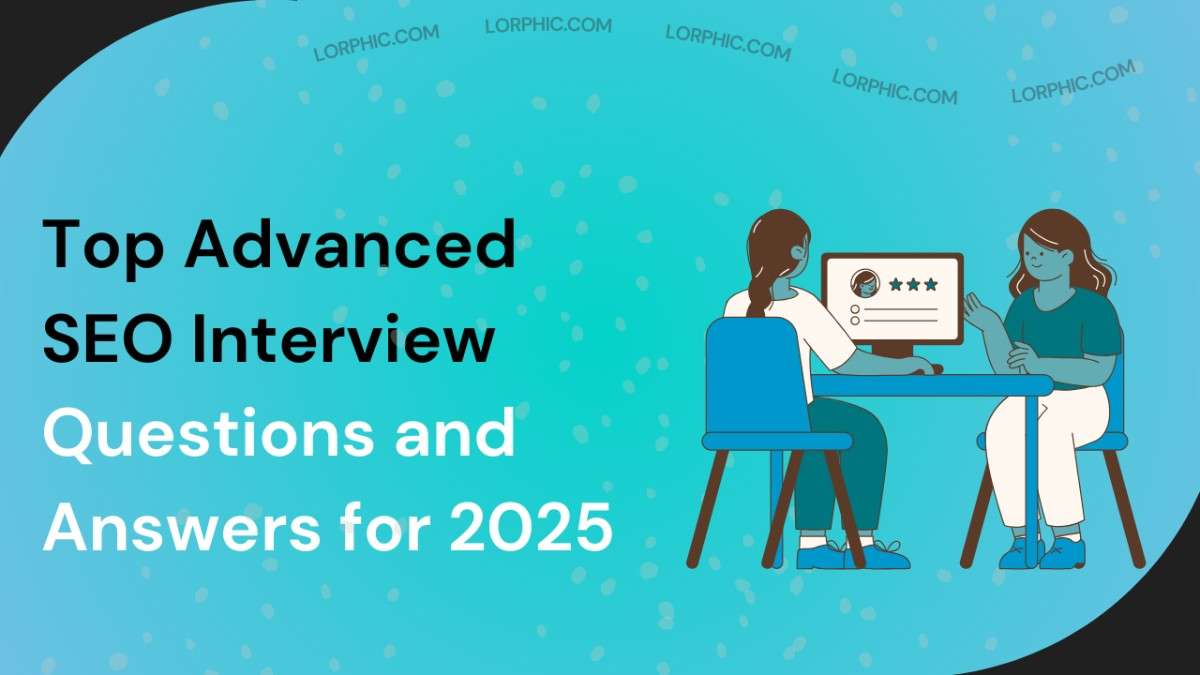Getting a senior SEO position involves more than a superficial knowledge of the basics. Hiring managers will probe your strategic thinking skills, problem-solving capabilities, and ability to keep pace with the ever-changing nature of the industry. They need to see evidence that you can produce actionable results.
These are some of the most typical advanced SEO interview questions and answers you will see in 2025. Utilize these sample answers to develop your own answers, demonstrate your know-how, and make a lasting impression on your future employer.
10+ Advanced SEO Interview Questions and Answers
Here are some of the top questions you might face when interviewing for an advanced SEO position, along with sample answers to help you prepare.
1. Can You Tell Me About the Latest Algorithm Changes and What They Mean for Potential Clients?
This question tests your awareness of current SEO trends. A strong answer will demonstrate that you stay informed and can translate complex algorithm updates into actionable strategies for clients.
Sample Answer:
“I actively follow major algorithm updates, like the recent Core Update, which heavily focused on reducing unhelpful content and rewarding sites with strong E-E-A-T signals. For clients, this means we must double down on creating genuinely useful content that demonstrates firsthand experience and authority. I’d explain that user satisfaction is paramount and that our strategy should prioritize high-quality, people-first content over trying to game the system. This approach builds long-term trust with both users and search engines.”
2. Have You Ever Seen an SEO Effort Fail? How Did You React?
Hiring managers ask this to gauge your honesty, problem-solving skills, and resilience. Show that you can learn from setbacks and take a data-driven approach to correct the course.
Sample Answer:
Yes, I’ve experienced campaigns that didn’t meet initial expectations. In one instance, a content strategy for a new service line failed to gain traction. Instead of abandoning it, I performed a deep dive into the analytics. I discovered a mismatch between our target keywords and user search intent. My reaction was to pivot quickly:
- I initiated new keyword research focused on informational, problem-based queries.
- We repurposed the existing content to better align with what users were actually searching for.
- This led to a 40% increase in organic traffic to those pages within two months.
3. How Often Do You Research Keywords? What Tools Do You Use?
This question assesses your process and the tools you’re proficient with. A good answer shows that keyword research is an ongoing activity, not a one-time task.
Sample Answer:
“I treat keyword research as an ongoing process, not something you do once and forget about. I conduct initial deep-dive research at the start of a project and then revisit it quarterly to identify new opportunities and adapt to changing trends. My go-to tools include Ahrefs for competitive analysis and keyword gap analysis, and SEMrush for identifying keyword intent. I also use Google Search Console to find ‘striking distance’ keywords that we can target for quick wins.”
4. A Site That’s Been Online 9 Months is Getting Zero Traffic. Why?
This scenario-based question tests your diagnostic abilities. Break down your thought process to show how you would systematically investigate the problem.
Sample Answer:
“For a nine-month-old site with no traffic, I’d start with a technical audit. My first suspicion would be an indexing issue. I would check the robots.txt file for incorrect ‘Disallow’ directives and look for ‘noindex’ tags in the page headers. If there are no technical barriers, I’d then investigate the content itself. The issue could be a lack of high-quality, optimized content or a failure to build any backlinks, leaving the site with no authority to rank.”
5. How Do You Check If Googlebot May Have Problems Accessing Site Content?
Your answer should demonstrate your technical SEO proficiency. Mention specific tools and methods you use to diagnose crawlability issues.
Sample Answer:
“To check for Googlebot accessibility issues, my first stop is always Google Search Console. I use the URL Inspection tool to test individual URLs and see how Googlebot renders them. I also review the Crawl Stats report to identify any spikes in crawl errors. Additionally, I use tools like Screaming Frog to run a site crawl, which helps me spot broken links, redirect chains, or pages blocked by robots.txt that could be hindering Googlebot’s access.”
6. What’s Your Strategy for Managing Crawl Budget on a Large E-Commerce Website?
This is a classic technical SEO question for roles involving large, complex websites. A strong answer will focus on efficiency and prioritization.
Sample Answer:
On a large e-commerce site, crawl budget optimization is critical. My strategy involves:
- Improving Site Structure: Creating a logical internal linking structure to guide crawlers to high-priority pages.
- Managing URL Parameters: Using the robots.txt file or Google Search Console’s URL Parameters tool to prevent crawlers from accessing URLs with tracking parameters or faceted navigation filters.
- Using Sitemaps: Maintaining clean, accurate XML sitemaps that only include canonical, indexable URLs.
- Minimizing Redirects: Regularly auditing and fixing redirect chains to ensure the crawl budget isn’t wasted.
7. How Do You Ensure Your SEO Strategy Aligns with E-E-A-T and Google’s Quality Guidelines?
This question tests your understanding of Google’s emphasis on content quality and trustworthiness. Your answer should connect E-E-A-T principles to concrete actions.
Sample Answer:
E-E-A-T is at the core of my SEO philosophy. To align with it, I ensure our content strategy includes:
- Author Bios: Featuring clear author bios that highlight their expertise and credentials.
- Citing Sources: Linking out to authoritative sources to back up claims.
- Firsthand Experience: Creating content that showcases genuine experience with a product or topic, such as original photos or unique insights.
- Trust Signals: Displaying customer reviews, case studies, and clear contact information to build user trust.
8. Can You Walk Me Through How You’d Structure a Content Hub or Topic Cluster?
This assesses your content strategy skills. Outline a clear, step-by-step process that demonstrates your ability to build topical authority.
Sample Answer:
My process for building a topic cluster starts with identifying a broad, high-volume ‘pillar’ topic. From there, I:
- Identify Cluster Topics: I use keyword research to find specific, long-tail keywords related to the pillar topic. These become the ‘cluster’ articles.
- Create Pillar Page: I develop a comprehensive pillar page that covers the main topic broadly and links out to each cluster page.
- Develop Cluster Content: I create detailed articles for each cluster topic, focusing on answering specific user questions.
- Implement Internal Linking: I ensure every cluster page links back to the pillar page. This structure signals topical authority to Google and improves user navigation.
9. What’s Your Process for Conducting an SEO Competitor Analysis?
A good answer will show a structured approach to analyzing competitors and using that data to inform your own strategy.
Sample Answer:
My competitor analysis process is comprehensive. I start by identifying the top 3-5 true organic competitors, not just business rivals. Then, I analyze:
- Top Keywords and Content: What keywords are they ranking for, and what kind of content is driving their traffic?
- Backlink Profile: Where are they getting their links from? I use tools like Ahrefs to identify link-building opportunities.
- On-Page SEO: How are they structuring their pages, using internal links, and optimizing their meta tags?
10. What’s Your Strategy for Handling Indexing Issues on Large Websites?
Similar to the crawl budget question, this tests your technical expertise with large-scale websites. Your strategy should be systematic and prioritized.
Sample Answer:
“For indexing issues on a large site, I first use Google Search Console’s Index Coverage report to diagnose the problem. Are pages excluded as ‘Crawled – currently not indexed’ or ‘Discovered – currently not indexed’? Based on the issue, I prioritize fixes. For example, ‘Crawled – currently not indexed’ often points to content quality issues, so I’d focus on improving or consolidating thin content. For ‘Discovered’ issues, I’d check internal linking to ensure important pages are being found by Googlebot.”
11. How Do You Approach SEO for a Website Migration or Redesign to Prevent Traffic Loss?
Website migrations are high-stakes. Your answer must show that you are meticulous and proactive in your planning.
Sample Answer:
A successful site migration requires a detailed pre-launch, launch, and post-launch plan.
- Pre-launch: I map every old URL to its new equivalent in a 301 redirect map. I also crawl the new site in a staging environment to catch any issues before they go live.
- Launch: I work with the development team to ensure all 301 redirects are implemented correctly as soon as the new site goes live.
- Post-launch: I closely monitor Google Search Console for any crawl errors or indexing issues. I also track organic traffic and keyword rankings to quickly address any dips.
Final Thoughts
Success in an advanced SEO interview comes down to preparation and the ability to articulate your strategic thinking. Use these questions as a starting point to reflect on your experiences and craft compelling stories that highlight your skills and achievements. By demonstrating your expertise and passion for SEO, you can show any hiring manager that you are the right person to drive their organic growth forward.




